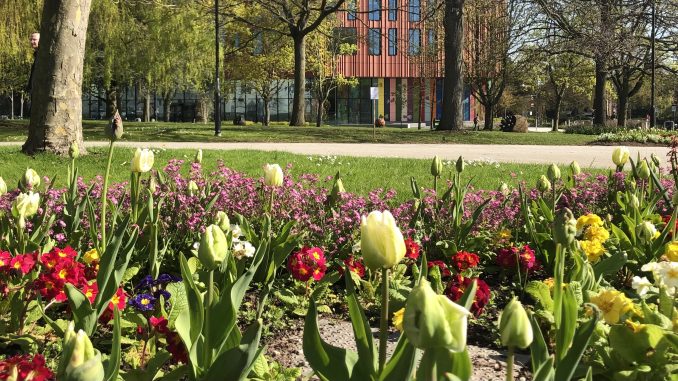
Sessions this week: Intro to the Digital Humanities Certificate; Sources of Support at Warwick.
Recording available in Teams (membership required).
This term sees the start of the DAHL Shorts series (30 minute sessions) and the Digital Humanities Certificate for staff and PGRs. We’ve had about 30 people register for the certificate, with 25 joining us for the first sessions on Wednesday 26th – some in the physical room and some online. We used our new Logitech Meet Up Teams camera and mic system, which worked quite well (apart from the need to manually control where the camera was pointing so as to capture people speaking in the room). These kits are available for free loan from AV Services. They also have the Meeting Owl system, which has an automated camera. Both systems are simple plug-and-play additions to Teams meetings.
Along with video and audio sharing, we also used the MiroA collaborative online whiteboard application, free to use in Higher Education. Create whiteboards of almost unlimited size, add frames to organise content, share the whiteboard with anyone via a link, collaborate together live from anywhere in the world. Content that can be added includes: text, im... More online collaborative whiteboard system to share text and images and to undertake a collaborative exercise – sharing some information about ourselves to the board. We will carry on using this board, with a more in depth introduction to MiroA collaborative online whiteboard application, free to use in Higher Education. Create whiteboards of almost unlimited size, add frames to organise content, share the whiteboard with anyone via a link, collaborate together live from anywhere in the world. Content that can be added includes: text, im... More in the DAHL Shorts session on 17th May (you can get a free license for Miro). It was noted that our previous cohort of DHCert participants found MiroA collaborative online whiteboard application, free to use in Higher Education. Create whiteboards of almost unlimited size, add frames to organise content, share the whiteboard with anyone via a link, collaborate together live from anywhere in the world. Content that can be added includes: text, im... More to be one of the most useful tools, with some finding new uses for it in teaching, research, and outreach. Raad Allah Khair will demo her use of MiroA collaborative online whiteboard application, free to use in Higher Education. Create whiteboards of almost unlimited size, add frames to organise content, share the whiteboard with anyone via a link, collaborate together live from anywhere in the world. Content that can be added includes: text, im... More in a community-building research project on 24th May.
As we were adding information about ourselves to the Miro board, individual participants introduced themselves to the group and talked about their initial interests. These covered the full range of DH applications: research (building and analysing catalogues of data), teaching (both using tech in teaching and teaching about DH), collaboration (tools to help with projects), and public engagement. We will be covering all of these in the sessions, as well as using tools and techniques ourselves to collaborate. Our first set of collaboration tools being: Teams, MiroA collaborative online whiteboard application, free to use in Higher Education. Create whiteboards of almost unlimited size, add frames to organise content, share the whiteboard with anyone via a link, collaborate together live from anywhere in the world. Content that can be added includes: text, im... More, and WordPress (this blog). There will be opportunities to learn more about all of these, including contributing to this web site in WordPress. I talked a little about the difference between the “hardcore” definition of DH as being purely focussed on data and analysis, and the broader approach we are taking to DH in the cert (in response to what last year’s participants found interesting). Bryan Brazeau will touch on this further in his session on 10th May. You might also want to read these articles for context:
What are Digital Humanities?
21st Century Academic
You might want to respond to this debate when you come to write/record your reflective piece at the end of the certificate.
We also introduced one of the most important topics for the DHCert, how DH has to always be a team activity, relying on a collaboration of people in some quite different roles: academic, technical, and organisational. Even when you seem to be working on your own, there’s actually a team of people enabling what you do, and people who can help you to do more better. This was covered in a series of blog articles written specially for the DHCert, beginning with 7 Essential Roles in Digital Arts and Humanities Projects. A central goal of the certificate process is to deepen and widen the capabilities of all participants – that might mean gaining some of the skills and techniques of a programmer, it might mean being able to build a project team including programmers, or it perhaps just knowing how to get some help from a programmer. It depends on you and what you want to achieve. Over the coming weeks we will explore these roles more in the DAHL Shorts sessions, as well as hopefully have one-to-one conversations to see where you want to go with it and to make a plan.
In week 2 we have a session with Karen Jackson & Andrew Calvert (Library and MRC) on “finding inspiring and useful data sources”, and Robert O’Toole (that’s me) delving deep into some really powerful techniques using the latest mind/concept mapping software – see this article for more information on that. I’m looking forwards to seeing you all again on Wednesday, in Teams or in FAB0.23.

Leave a Reply